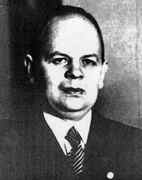Person: Ackermann, Wilhelm

Wilhelm Ackermann was a mathematical logician who worked with David Hilbert in Göttingen but spent his career as a high school teacher.
Mathematical Profile (Excerpt):
- Ackermann entered the University of Göttingen in 1914 to study mathematics, physics and philosophy.
- Ackermann was drafted into the army in 1915 and continued to serve until 1919 when he was able to return to his studies in Göttingen.
- Ackermann's work, on the other hand, arose entirely out of Hilbert's research project, and there is ample evidence that Hilbert was aware of the range and details of the proof.
- After submitting his dissertation, Ackermann went to Cambridge, England, where he spent the first half of 1925.
- Ackermann has here surmounted considerable mathematical difficulties and solved a problem which is of first importance to the modern efforts directed at providing a new foundation for mathematics.
- Ackermann was also the main contributor to the development of the logical system known as the epsilon calculus, originally due to Hilbert.
- In 1928, Ackermann observed that A(x,y,z)A(x, y, z)A(x,y,z), the zzz-fold iterated exponentiation of xxx with yyy, is an example of a recursive function which is not primitive recursive.
- It is the latter which occurs as Ackermann's function in today's textbooks.
- Also in 1928 the often reprinted book Grundzüge der Theoretischen Logik Ⓣ(Principles of Theoretical Logic) by Hilbert and Ackermann appeared.
- Among Ackermann's later work are consistency proofs for set theory (1937), full arithmetic (1940) and type free logic (1952).
- The new axiomatization of set theory was presented by Ackermann in Zur Axiomatik der Mengenlehre Ⓣ(On axiomatic set theory) (1956).
- In 1957 Ackermann published Philosophische Bemerkungen zur mathematischen Logik und zur mathematischen Grundlagenforschung Ⓣ(Philosophical remarks on mathematical logic and basic mathematical research) and its English translation Philosophical observations on mathematical logic and on investigations into the foundations of mathematics.
- This paper, written for non-experts in the subject, gives an excellent overview of how Ackermann viewed mathematical logic.
- Ackermann remarks that the traditional modes of inference are included in mathematical logic, besides many others, like the statement logic or the logic of relations.
- Ackermann presents intuitionism, which constructs a mathematics with a minimum of logic, and the Frege-Russell analysis of the number concept.
Born 29 March 1896, Schönebeck (Kr. Altena), Germany. Died 24 December 1962, Lüdenscheid, Germany.
View full biography at MacTutor
Tags relevant for this person:
Origin Germany
Thank you to the contributors under CC BY-SA 4.0! 

- Github:
-

- non-Github:
- @J-J-O'Connor
- @E-F-Robertson
- @Felscher
References
Adapted from other CC BY-SA 4.0 Sources:
- O’Connor, John J; Robertson, Edmund F: MacTutor History of Mathematics Archive
